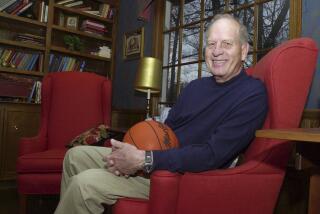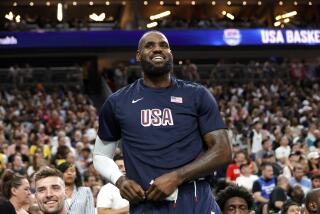Frank Lubin, a Big Man in Two Countries : Basketball: He helped U.S. win Olympic gold medal in 1936, and later introduced the sport to Lithuania, where his parents were born.
- Share via
The children at the junior high in Carson listened carefully as Frank Lubin, a former U.S. Olympic basketball player, spoke during a recent career day.
Lubin told the youngsters to stay in school and to avoid drugs and alcohol because they had the potential to be Olympic athletes.
When Lubin was finished, they pestered him for autographs.
It was the repeat of a scene from the early part of the century.
As a youngster, Frank Lubin had listened attentively to a former Olympian addressing the students of Belvedere elementary school in East Los Angeles.
“I promise you that one of you is going to be an Olympic athlete,” the man said.
Although it happened more than 70 years ago, Lubin, 80, still recalls the moment vividly.
“When he said that one of us was going to be an Olympic athlete, I think he looked straight at me,” Lubin said.
In any event, the prediction was accurate. Lubin eventually led the U.S. Olympic basketball team to a gold medal at the 1936 Games in Berlin.
“When we won the Olympic Games in 1936, I got a cable offering me employment from the Denver Safeway Piggly Wiggly team, subject to immediate acceptance,” Lubin said. “The offer was $35 a week.”
Rejecting it because he was making $50 a week as a studio stagehand, Lubin went to visit relatives in Lithuania, where his parents had been born. He stayed for three years.
Known there as Pranas Lubinas, Lubin taught the Lithuanians to play basketball. Serving as player-coach, he led the Lithuanian national team to European championships in 1937 and 1939. He scored the winning basket in the 1937 European championship game.
“I made them toe the line with my style,” Lubin said. “I taught them fast break, passing and defense. It may not be the style of the pros today where one man, like Michael Jordan, shoots all the time. I didn’t teach them to be a one-man team, I taught them to pass it to the man who had the best open shot.”
Lubin left Lithuania before World War II and was in Italy, coaching a Lithuanian women’s team, when it broke out.
“We had a problem because we had to cross Germany to get (back) to Lithuania,” Lubin said.
Marooned in Milan, Lubin asked for help from Italian officials, who allowed the team to return to Lithuania by train and boat, avoiding Germany.
After returning to America, he continued to play basketball and is considered one of the greatest players in AAU history. He played until 1955, when knee problems prompted him to retire.
But he wasn’t forgotten in Lithuania.
Known as the godfather of Lithuanian basketball, the players Lubin taught eventually became coaches themselves and later helped develop such players as Arvydas Sabonis, Sarunas Marciulionis, Rimas Kurtinaitis and Voldemaras Chomicius, who led the Soviet Union’s Olympic basketball team to a gold medal in the 1988 Olympics. In the Soviet Union’s 82-76 victory over the United States, the four Lithuanians scored 62 points.
“They’re actually my second-generation students,” Lubin said. “I had no contact with the four boys that played for Russia in 1988, but my students coached in Lithuania for many years.”
Lubin had a reunion with his players when he returned to Lithuania last year to celebrate the 50th anniversary of their European championship. He was welcomed by the president of Lithuania and the Soviet ambassador.
Crowned with flowers and showered with chocolates, Lubin was treated as visiting royalty. Hounded by autograph seekers and photographers, Lubin posed for pictures with Sabonis. One of the biggest selling calendars in Lithuania has a picture of Lubin and Sabonis.
It was their second meeting.
“When Sabonis came to America after he was drafted by the Portland Trail Blazers, he said he’d come to Los Angeles if he could meet Pranas Lubinas,” Lubin said.
When Lubin shot up to 6 feet 6 1/2 inches at Lincoln High School, classmates encouraged him to try out for the basketball team.
Rather reluctantly, he agreed. Gangly and uncoordinated, though, Lubin struggled.
“My high school coach couldn’t see any use for me,” Lubin said. “He was making me jump center and then he’d put me on the bench.
“Once, he got so mad at me that he threw the ball at me and he told me go in the ladies’ gym and practice shooting the ball because I wasn’t coordinated.”
But Lubin persisted and made the All-City second team as a senior in 1927. Then he moved on to UCLA, where he played basketball for the Bruins, earning All-Coast honors as a senior in 1931.
After graduating from UCLA, he briefly attended Cal’s law school and continued to play basketball for the San Francisco Olympic Club.
But times were hard and Lubin was forced to drop out of school. Returning to Los Angeles, he went to work as a grip for Universal Pictures, forerunner of Universal Studios, where he played for the studio’s AAU basketball team.
When Universal won the U.S. Olympic tournament, the team was selected to represent the United States in the first Olympic basketball competition at the 1936 Games in Berlin.
But the studio heads, angry that the Games were being held in Nazi Germany, refused to sponsor the team’s trip to Berlin.
Determined to go anyway, the team barnstormed across the nation, playing in towns large and small to earn the money for the trip.
Playing on an outdoor court, the United States won the gold medal, defeating Canada in the final, 19-8, during a downpour that left two inches of water on the court.
“Hitler didn’t see basketball as an indoor sport,” Lubin said. “He didn’t think it was very popular so we had to play on a gravel court.”
After finally returning to Los Angeles in 1939, Lubin expected to receive a hero’s welcome. After all, he had helped the United States win an Olympic gold medal.
Instead he was fired.
“Universal didn’t want me to go to Nazi Germany, so when I returned, my job wasn’t there,” Lubin said. “I never worked at Universal since. We had no money to get back to America. We were just cut off from American society.”
Lubin continued to work in the movie industry, though, going to 20th Century Fox as a stagehand.
During his 30 years at Fox, Lubin led the studio basketball team to more than 20 Southern California AAU titles as player-coach.
In 1981, he was honored as one of the greatest Los Angeles-born athletes as part of the City’s bicentennial celebration.
In 1984, Coach Bobby Knight invited Lubin to address the U.S. Olympic team. As Lubin entered the dressing room before a game, Knight said, “See this man here? He has something you don’t have. A gold medal.”
More to Read
Go beyond the scoreboard
Get the latest on L.A.'s teams in the daily Sports Report newsletter.
You may occasionally receive promotional content from the Los Angeles Times.






